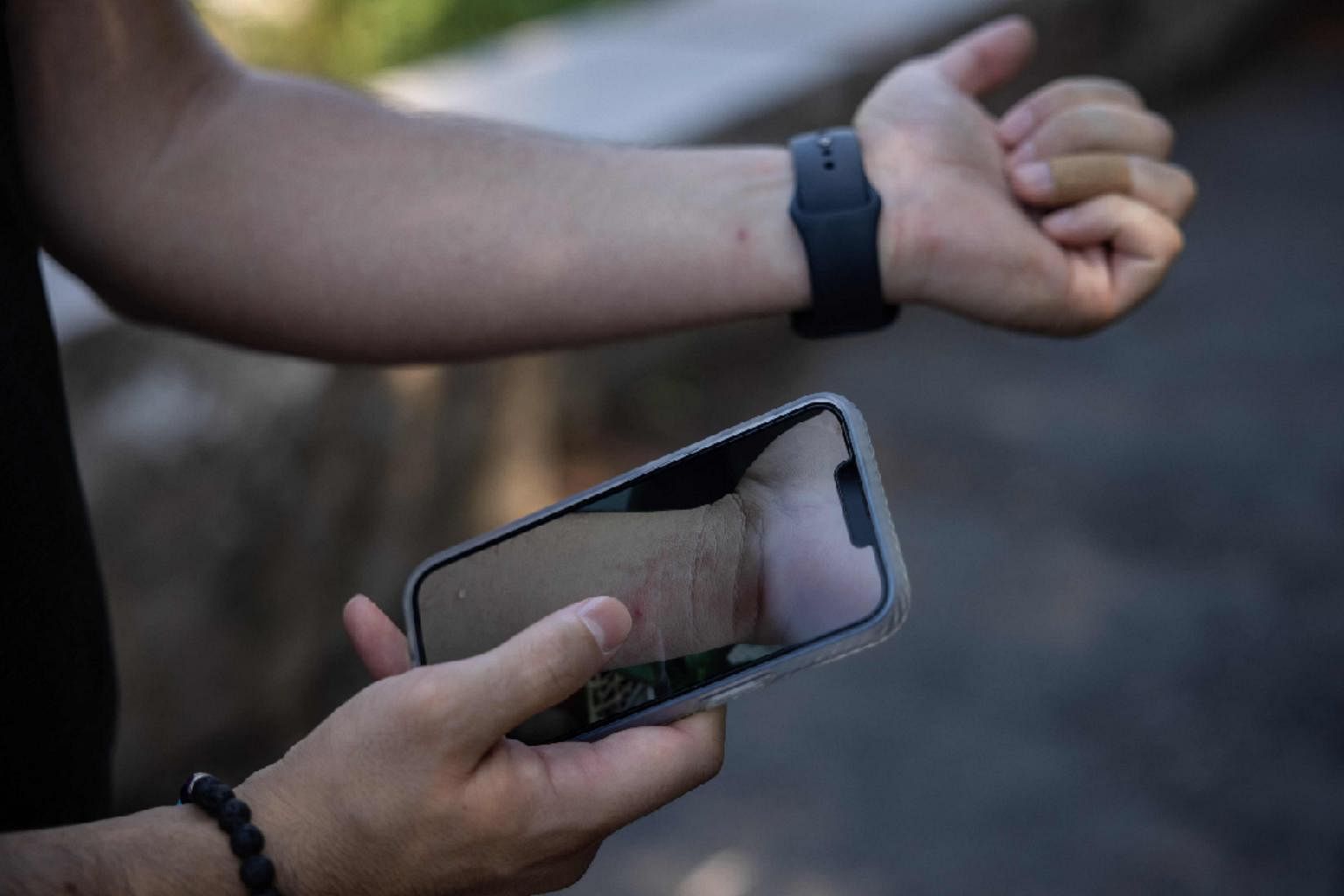askST: Can monkeypox be transmitted asymptomatically?
Sign up now: Get ST's newsletters delivered to your inbox

The extent of asymptomatic cases and whether these can spread the virus is still unknown at this stage.
PHOTO: AFP
SINGAPORE - With more than 14,000 monkeypox cases reported in more than 70 countries and territories mostly since May, the World Health Organisation (WHO) will hold an emergency meeting on Thursday (July 21) to decide whether the outbreak constitutes a global health emergency.
WHO's emergency committee for the monkeypox outbreak met for the first time on June 23, and on June 25, the global health body said the outbreak did not constitute what it calls a public health emergency of international concern (PHEIC).
There have been five deaths in this monkeypox outbreak, all in Africa.
In Singapore, the authorities have registered six cases of monkeypox, three of which are local cases. None of them is linked.
Associate Professor Hsu Li Yang, an infectious diseases expert at National University of Singapore's Saw Swee Hock School of Public Health, said the local cases are generally similar to the global ones, and are neither more nor less worrying in that regard.
"But the presence of unlinked cases means we will likely see more cases of local monkeypox cases in the near future, and that the outbreak in Singapore has not been controlled yet," he said.
"The silver lining is that the number of cases remains very small, with new cases popping up sporadically rather than in increasingly large numbers."
In the past, the disease would surface incidentally in humans, and usually sporadically in forested parts of Central and West Africa, where it is endemic.
In the current outbreak, monkeypox started spreading quickly in Europe, which experts have linked to raves and the LGBTQ (lesbian, gay, bisexual, transgender and queer or questioning) Pride events there. It is almost certainly transmitted via close contact during sexual intercourse, said Prof Hsu.
Most of the cases in the current outbreak are being spread in networks of men who have sex with men.
Overseas, monkeypox cases were picked up at sexual health clinics when people sought help for what they thought was a sexually transmitted infection.
In Singapore, the Department of Sexually Transmitted Infections Control (DSC) clinic, run by the National Skin Centre (NSC), has seen one confirmed monkeypox case, said Professor Roy Chan, a senior consultant and medical adviser at NSC.
Q: Can monkeypox be transmitted asymptomatically?
A: "We don't know as yet, but asymptomatic cases of monkeypox have been described during this outbreak, which is novel in the sense that we had previously assumed that virtually all monkeypox cases would have symptoms and the rash," said Prof Hsu.
The extent of asymptomatic cases and whether these can spread the virus are still unknown at this stage, he added.
When asked the same question, Associate Professor Lim Poh Lian, the director of the high-level isolation unit at the National Centre for Infectious Diseases (NCID), said: "We never say never in medicine, but most monkeypox cases are spread by close skin-to-skin contact, and through contaminated bedding."
The question has a familiar ring to it, as in the early days of the Covid-19 outbreak, experts had expected that only symptomatic cases could spread the disease, but it turned out otherwise.
However, there are very clear differences, including the current main transmission mode and the fact that monkeypox is not a new disease.
"With all diseases, there are major modes of transmission and minor modes," said Prof Lim from NCID.
"We should be aware of all the ways monkeypox can spread. But it is helpful to focus on what the current evidence shows us, which is (that it is) mainly spread by symptomatic cases through intimate contact."
Q: Has the monkeypox virus evolved to become more contagious now?
A: "We do not know for sure yet whether the current monkeypox virus spreading globally is truly more contagious. But human behaviour is fuelling this current rapid spread, coupled with the fact that many infections are... very mild," said Prof Hsu.
While the current outbreak could lead to the emergence of variants that may be more transmissible or virulent, it would generally not be dramatically more transmissible or virulent, he said.
Q: What can I expect if I have monkeypox?
A: Most monkeypox cases recover well.
Prof Lim said the fever lasts two to three days usually, and is generally mild. New skin blisters will continue to develop over a week or so, then take two weeks to dry up, and for the scabs to fall off and for new healthy skin to form, she said.
"The scabs are infectious, so the infectious period, when the individual has to remain in isolation to prevent the spread of infection to others, is likely to be three weeks or more."
Young children, pregnant women and persons with weakened immune symptoms may experience more severe disease. There have been overseas reports of cases requiring ICU care but those remain very rare.
Q: How are the monkeypox cases managed at NCID?
A: Generally, no specific antiviral treatment is needed for mild cases, said Prof Lim.
"However, we do have antiviral medications, such as cidofovir, which can be used. Such medications have known risks, so we would use them only if the patient's clinical condition warrants it."
Q: What symptoms do the monkeypox patients at NCID have?
A: Monkeypox symptoms include fever, body ache and a rash. The rash may start out as a small pimple in parts of the body that don't usually get pimples, like the genital area, but over a few days, these develop into blisters. Some people also get swollen lymph glands in the groin along with the blisters, Prof Lim said.
Q: What other symptoms have been described by patients overseas?
A: Monkeypox is usually considered mild, and most people recover without treatment. However, it is frequently uncomfortable or painful, said a July 15 release from the WHO office in Europe. In the United States, reports have mentioned painful lesions in the anus, genitals and mouth.
In the WHO release, a monkeypox patient said he had first fallen ill with fever, and then his lymph nodes felt achy, really painful and swollen.
Initially, one blister, the size of the tip of a pen, appeared on his nose, but it got bigger and more painful, he said. "Due to the lesions in my throat, I couldn't swallow, eat or drink. That was painful," he said.
He was put on heavy painkillers, on antibiotics because of a secondary bacterial infection, and fed through an intravenous drip. It was severe but he is better, he said in the release.
Q: Are there any vaccines for monkeypox?
A: Smallpox vaccines are being used as the monkeypox virus is closely related to the virus that causes smallpox. In the US, the Food and Drug Administration or FDA has licensed two vaccines – Jynneos and Acam2000 - for use against monkeypox.



